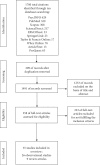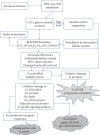Psychological Stress and Cellular Aging in Cancer: A Meta-Analysis
- PMID: 31814865
- PMCID: PMC6877941
- DOI: 10.1155/2019/1270397
Psychological Stress and Cellular Aging in Cancer: A Meta-Analysis
Abstract
Background: Epidemiological evidence continues to accumulate on the effect of psychosocial and behavioral factors in relation to cancer risk, progression, and mortality.
Material and methods: This article presents the current evidence on the relationship between psychological stress and the risk of cancer and cellular aging process. Ten databases were searched to identify publications up to September 2019. References from retrieved articles were also reviewed. We included nine review papers and 26 cohort or case-control studies based on inclusion/exclusion criteria.
Results: Results of previously published review articles did not show consistent evidence for the association between cancer risk and psychological stress, while previous evidence is stronger regarding the role of chronic psychological stress on cancer growth and metastasis and aging. In seven observational studies, severe life events, anxiety, depression, insufficient social support perception, or avoiding coping strategy were significantly associated with breast cancer risk. For other specific types of cancer, 11 studies reported increased risk factors for stressful life events, and two others found increased mortality or a decline in treatment adherence.
Conclusions: Recent epidemiological evidence generally suggests psychosocial factors may be considered risk factors for specific types of cancer and play a key role in the cellular aging process. Understanding molecular mechanisms of the stress interaction is important in cancer management and prevention. The psychological stressors should be considered when developing or evaluating change in psychosocial practice.
Copyright © 2019 Joanna Kruk et al.
Conflict of interest statement
The authors declare no conflict of interest.
Figures


Similar articles
-
Folic acid supplementation and malaria susceptibility and severity among people taking antifolate antimalarial drugs in endemic areas.Cochrane Database Syst Rev. 2022 Feb 1;2(2022):CD014217. doi: 10.1002/14651858.CD014217. Cochrane Database Syst Rev. 2022. PMID: 36321557 Free PMC article.
-
Telephone interventions for symptom management in adults with cancer.Cochrane Database Syst Rev. 2020 Jun 2;6(6):CD007568. doi: 10.1002/14651858.CD007568.pub2. Cochrane Database Syst Rev. 2020. PMID: 32483832 Free PMC article.
-
Association between pacifier use and breast-feeding, sudden infant death syndrome, infection and dental malocclusion.JBI Libr Syst Rev. 2005;3(6):1-33. doi: 10.11124/01938924-200503060-00001. JBI Libr Syst Rev. 2005. PMID: 27819973
-
Beverage Consumption and Growth, Size, Body Composition, and Risk of Overweight and Obesity: A Systematic Review [Internet].Alexandria (VA): USDA Nutrition Evidence Systematic Review; 2020 Jul. Alexandria (VA): USDA Nutrition Evidence Systematic Review; 2020 Jul. PMID: 35349233 Free Books & Documents. Review.
-
Music interventions for improving psychological and physical outcomes in cancer patients.Cochrane Database Syst Rev. 2016 Aug 15;(8):CD006911. doi: 10.1002/14651858.CD006911.pub3. Cochrane Database Syst Rev. 2016. Update in: Cochrane Database Syst Rev. 2021 Oct 12;10:CD006911. doi: 10.1002/14651858.CD006911.pub4 PMID: 27524661 Updated. Review.
Cited by
-
Metabolic syndrome, metabolic comorbid conditions and risk of early-onset colorectal cancer.Gut. 2021 Jun;70(6):1147-1154. doi: 10.1136/gutjnl-2020-321661. Epub 2020 Oct 9. Gut. 2021. PMID: 33037055 Free PMC article.
-
Aryl hydrocarbon receptor blocks aging-induced senescence in the liver and fibroblast cells.Aging (Albany NY). 2022 May 26;14(10):4281-4304. doi: 10.18632/aging.204103. Epub 2022 May 26. Aging (Albany NY). 2022. PMID: 35619220 Free PMC article.
-
Evaluation of the benefits of neutral bicarbonate ionized water baths in an open-label, randomized, crossover trial.Sci Rep. 2024 Jan 13;14(1):1261. doi: 10.1038/s41598-024-51851-9. Sci Rep. 2024. PMID: 38218992 Free PMC article. Clinical Trial.
-
Lifetime employment trajectories and cancer.Sci Rep. 2024 Aug 30;14(1):20224. doi: 10.1038/s41598-024-70909-2. Sci Rep. 2024. PMID: 39215024 Free PMC article.
-
β-Adrenoceptor Activation in Breast MCF-10A Cells Induces a Pattern of Catecholamine Production Similar to that of Tumorigenic MCF-7 Cells.Int J Mol Sci. 2020 Oct 27;21(21):7968. doi: 10.3390/ijms21217968. Int J Mol Sci. 2020. PMID: 33120955 Free PMC article.
References
-
- Denaro N., Tomasello L., Russi E. G. Cancer and stress: what’s matter? From epidemiology: the psychologist and oncologist point of view. Journal of Cancer Therapy & Research. 2014;3(1):p. 6.
-
- Soung N. K., Kim B. Y. Psychological stress and cancer. Journal of Analytical Science and Technology. 2015;6(1):p. 30. doi: 10.1186/s40543-015-0070-5. - DOI
-
- Afrisham R., Paknejad M., Soliemanifar O., Sadegh-Nejadi S., Meshkani R., Ashtary-Larky D. The influence of psychological stress on the initiation and progression of diabetes and cancer. International Journal of Endocrinology and Metabolism. 2019;17(1, article e67400) doi: 10.5812/ijem.67400. - DOI - PMC - PubMed
Publication types
MeSH terms
LinkOut - more resources
Full Text Sources
Medical

